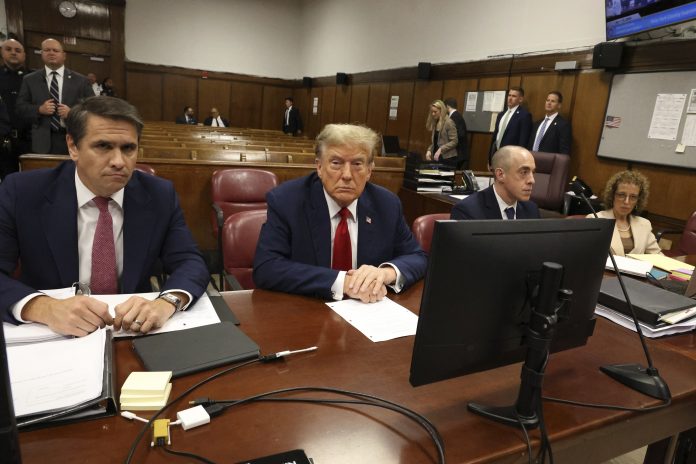A former American president went to trial for the first time in the nation’s history on Monday. Court proceedings were scheduled to start at 9:30 EDT in the New York County Supreme court in Lower Manhattan.
There were high emotions as Trump was expected to enter the courthouse, which was secured by hundreds of law enforcement personal and the Secret Service. It felt like a fortress.
It is the first of three criminal trials facing the Republican presidential candidate, while the others still dont have start dates. The so-called ‘Hush Money’ case is considered the weakest of the four, but it could still land Trump in jail.
He is fighting 34 felony counts of falsifying business records to cover up a hush money payment to porn star Stormy Daniels in the run-up to the 2016 presidential election. If convicted, the charges could land the presumptive Republican presidential nominee in prison: Many legal experts say a realistic sentence ranges from just probation to as much as four years behind bars.
It’s a case that is sure to divide the country. Republican voters delivered electoral victories for Trump in nearly every Republican primary held this year, despite knowing Trump faces four criminal cases, including the New York charges. Trump has portrayed both Manhattan District Attorney Alvin Bragg and trial Judge Juan Merchan as biased against him.
“There are some people who are just going to see this as a political trial, another one in New York where Trump is certainly not well liked,” Hank Sheinkopf, a New York City-based political consultant who worked for former President Bill Clinton, told USA TODAY.
“And then there are others who will see this as a way to deal with an illegality that should not have occurred ? we’re talking about paying off a porno star,” Sheinkopf said
Jury selection is set to start Monday, just over a year after Bragg announced the indictment against Trump on April 4, 2023. The trial is expected to last between six and eight weeks, according to a media advisory from the court.
Twelve jurors will be asked to decide whether the real estate mogul falsified business records at the Trump Organization in order to conceal or commit another crime ? a purpose that turns the acts into felonies under New York law.
Prosecutors allege Trump reimbursed his former lawyer, Michael Cohen, for the $130,000 hush money payment through a series of checks, falsely labeling them as payments for legal services. That concealed a federal election law violation because the $130,000 payment was meant to help Trump’s 2016 election and exceeded campaign contribution limits, according to the prosecution. They also say the records were meant to conceal plans to violate state tax and election laws.
Trump has pleaded not guilty to the charges and recently submitted a frenzy of legal filings trying to delay the trial, so far to no avail.
Both sides have framed the case as being about election interference ? but they are talking about different elections.
Manhattan District Attorney Alvin Bragg has said the case is about falsifying records in order to unlawfully interfere with the 2016 election.
“The core of it’s not money for sex,” Bragg said in a December WNYC radio interview. “We would say it’s about conspiring to corrupt a presidential election and then lying in New York business records to cover it up.”
Cohen paid Daniels less than two weeks before the Nov. 8 Election Day, and at a time when the Trump campaign was still reeling from the Oct. 7 release of the infamous “Access Hollywood” tape, in which Trump crudely described kissing women and grabbing their genitals. “When you’re a star, they let you do it,” he said.
Trump feared another scandal that could hurt his standing with female voters, according to prosecutors. “Ultimately, with pressure mounting and the election approaching, the Defendant agreed to the payoff,” they said in a case document.
Trump has said the case – and all his criminal and civil cases – are intended to harm his prospects in the 2024 election. They represent “an illegal attack on a Political Opponent” and “Election Interference at its Best,” he posted on his Truth Social media platform Wednesday.
Norman Eisen, a Brookings Institution senior fellow who served as special counsel to the House Judiciary Committee during Trump’s first impeachment, agreed with Bragg’s election-interference framing of the case.
“The reason that Donald Trump made hush money payments and then covered them up, triggering the financial falsification charges in New York, over 30 of them, is because he did not want another damaging sex scandal at the end of the 2016 election, right after Access Hollywood ? it could have tanked him,” Eisen told USA TODAY
The trial will start with jury selection, a days- or weekslong process in which both sides will try to suss out potential personal agendas towards Trump.
After jury selection, the two sides are expected to make opening arguments. The prosecution will then call witnesses and introduce evidence, while Trump’s team tries to poke holes in the prosecution’s case. After that, Trump’s side will have the option of putting on their own defense, including having Trump testify.
On Friday, Trump said at a Palm Beach news conference that he plans to testify in the New York trial.
“I’m testifying. I tell the truth. I mean, all I can do is tell the truth. And the truth is that there’s no case, they have no case,” Trump said.


